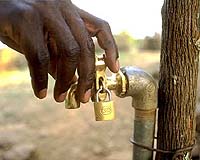| . |  |
. |
Ramallah, West Bank (UPI) Jun 24, 2009 Palestinian President Mahmoud Abbas said Israel must address the vital issue of water in the West Bank if meaningful peace talks are to take place. Israel's leaders said nothing, but Abbas had touched on one of the most sensitive issues in the seemingly endless negotiations, which have been in abeyance for the last few years, and one on which any expectation of a comprehensive settlement will probably ultimately rest. Israel's unilateral control over rivers and aquifers meant scarce water resources were not being shared equitably "as required by international law," he declared. "It is with dismay that I see 9,000 Israeli settlers in the Jordan Valley utilize one-quarter of the water that the entire Palestinian population in the West Bank utilizes," he told the World War Forum in Istanbul. In the largely arid Middle East, water is more valuable than oil and has been a source of conflict since time immemorial. As the world's resources, from oil to timber and minerals, dwindle, the prospect of more water wars in the Middle East in the decades ahead increase with each passing day. The crisis is deepened by rapidly expanding populations across the Arab world. This, coupled with industrial growth and a relentless drive for food self-sufficiency, is draining water supplies faster than they can be replenished. Global warming accelerates the damage. Climate experts warn that one-third of the Earth's surface may be at risk of extreme drought by the end of the century, triggering mass migrations of "environmental refugees." Many of those will be in the Middle East and North Africa. The region has been hit by a severe drought for the last five years, making the water issue all that more critical, aggravating a dispute between the Israelis, whose own water resources are dwindling, and the Palestinians, who sit on a major aquifer under the West Bank that Israel covets as much as its ever-expanding archipelago of settlements. Israel views the water from the West Bank -- as it did the water it siphoned off from the Litani River in Lebanon during its 1978-2000 occupation of that country's southern zone -- as vital to its national security. The Palestinians will not be able to sustain a viable independent state without water. In April, the World Bank placed the contentious water issue firmly in the forefront of efforts to secure a settlement by accusing Israel of taking four times as much water as the Palestinians from the aquifer they have shared since Israel conquered the West Bank in the 1967 war. Under the 1995 Oslo II Accords, Israel was given rights to 75 percent to 80 percent of the water supply from the three aquifers that straddle the Green Line, the June 1967 border between Israel and the West Bank. At that time, the estimated drain on the aquifers was an estimated 679 million cubic meters a year. Israel was supposed to take about 540 cubic meters but in fact has been using 871 million a year. That is just one example of how the Oslo Accords have been ignored or systematically eroded over the years as the peace process lurched from crisis to crisis. Israeli officials disputed the World Bank's findings and argued that the water problem should be solved by finding new sources through desalination and water treatment. "There isn't enough water in this area," said Yossi Dreisen, an adviser to the Israeli Water Authority. "Something must be done. The solution where one is giving water to the other is not acceptable to us." The policy of successive Israeli governments to continue settlement expansion in the West Bank, in defiance of international law and United Nations resolutions, worsens the water crisis. "The Israeli-Palestinian conflict is as much about resources as it is about land," The National newspaper in the United Arab Emirates commented in April. "It is no coincidence, for example, that West Bank settlements are located on top or near groundwater wells, a strategy that dates back to the earliest days of the settler movement. But the situation has worsened in the past decade." Share This Article With Planet Earth
Related Links Water News - Science, Technology and Politics
 ADB chief urges investments in water infrastructure
ADB chief urges investments in water infrastructureSingapore (AFP) June 23, 2009 Investments in water infrastructure must be sustained if Asia is to succeed in reducing poverty and maintaining strong economic growth, the region's top development banker said Tuesday. Asian Development Bank (ADB) president Haruhiko Kuroda said the global economic slump should not be a reason to cut back on investment in projects aimed at increasing water supply and managing waste water. ... read more |
|
| The content herein, unless otherwise known to be public domain, are Copyright 1995-2009 - SpaceDaily. AFP and UPI Wire Stories are copyright Agence France-Presse and United Press International. ESA Portal Reports are copyright European Space Agency. All NASA sourced material is public domain. Additional copyrights may apply in whole or part to other bona fide parties. Advertising does not imply endorsement,agreement or approval of any opinions, statements or information provided by SpaceDaily on any Web page published or hosted by SpaceDaily. Privacy Statement |